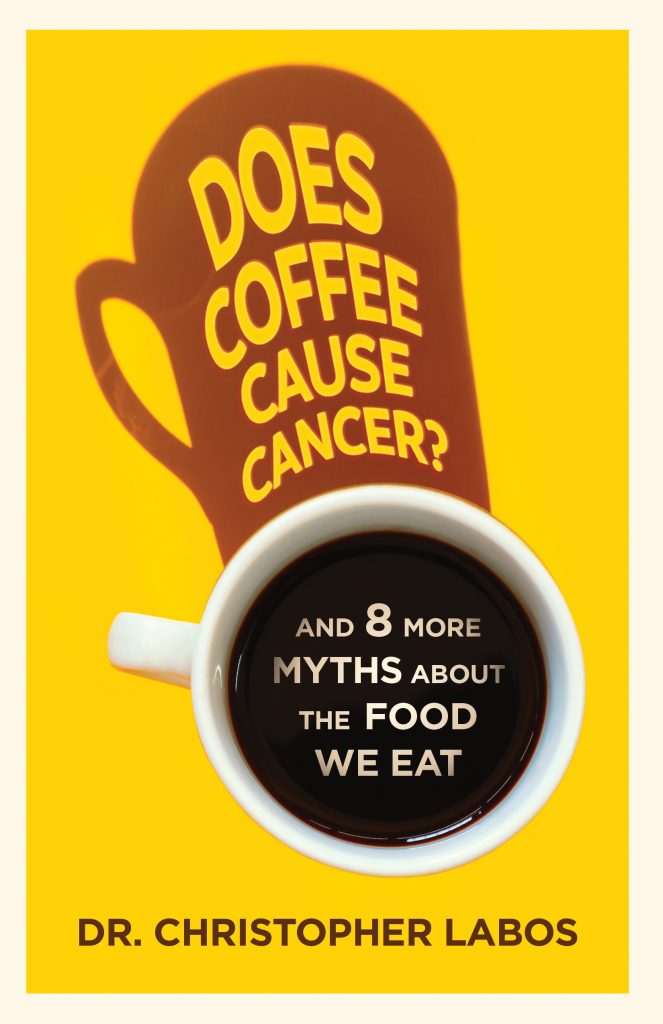There’s been a tidal wave of pseudoscience and misinformation around health and food since the pandemic, supporting a billion dollar “natural” health industry. In a world inundated with information about what to eat and what to avoid, navigating the realm of nutrition can be a daunting task. Dr. Chris Labos, in his book Does Coffee Cause Cancer? And 8 More Myths about the Food We Eat, sets out to debunk common myths and misconceptions surrounding our dietary choices. https://www.facebook.com/drlabos/

The book’s premise revolves around unraveling nine prevalent food-related myths, ranging from the relationship between coffee consumption and cancer to the purported dangers of salt. What makes this book a compelling read is its evidence-based approach. Dr. Labos sifts through scientific studies, dissecting each myth with a critical yet accessible perspective, allowing readers to understand the nuances behind these claims.

One of the book’s highlights is its ability to debunk myths without oversimplifying complex scientific concepts. Labos presents the information in a manner that’s both informative and engaging, making it accessible to readers regardless of their familiarity with scientific jargon. He delves into the intricacies of study design, statistical significance, and the limitations of research findings, empowering readers to discern between sensationalized headlines and substantiated facts.
I asked Dr. Labos for a favourite recipe and since he just made Mussels au Gratin for dinner, we share it with you in the Recipe section. I love mussels and enjoyed Chris’ take on an indulgent (but easy!) version. Psst…the perfect dish to make for your Valentine!

Dr. Labos doesn’t merely negate myths but also sheds light on the origins of these misconceptions. Whether it’s the purported benefits of dark chocolate and red wine or the demonization of hot dogs, he explores the historical context and societal influences that have contributed to the perpetuation of these myths. By unraveling the stories behind these misconceptions, Labos encourages a more nuanced understanding of the complexities within nutrition science.
The book doesn’t shy away from addressing the uncertainties inherent in scientific research. It emphasizes the evolving nature of nutritional science, acknowledging that some answers may still elude us due to the limitations of current methodologies. However, instead of fostering doubt, this acknowledgment reinforces the importance of critical thinking and ongoing research in understanding the relationship between food and health.

Ultimately, Does Coffee Cause Cancer? is a commendable effort to demystify prevalent misconceptions in nutrition. Dr. Chris Labos navigates through the labyrinth of food-related myths with a blend of scientific rigor and accessible storytelling, empowering readers to make more informed choices about their diets. Like chocolate… “No, chocolate isn’t good for you. Sorry, that’s not to say you can’t eat it on Valentine’s Day. Just don’t delude yourself into thinking it’s healthy or beneficial in any way.” https://www.mcgill.ca/oss/article/medical-health-and-nutrition/no-chocolate-isnt-good-you-sorry

In a world where misinformation often dominates the discourse on food and health, this book serves as a beacon of reason, advocating for a balanced approach to understanding the science behind what we eat. Go to our Giveaway section to win a copy of this insightful book or purchase it at https://ecwpress.com/collections/popular-science/products/does-coffee-cause-cancer
Whether you’re a health enthusiast, a skeptic of dietary fads, or someone seeking clarity amidst conflicting nutritional advice, Dr. Labos’ book offers an invaluable toolkit to sift through the noise and discern the facts from the myths in the realm of food and health.
Contents and images used with permission by ECW Press. https://ecwpress.com/collections/popular-science/products/does-coffee-cause-cancer


